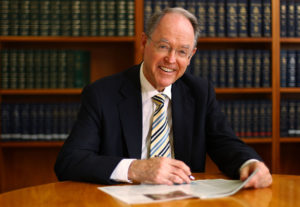
Don Brash fronts a new group to fight the Maori gravy train. Named Hobson’s Pledge, the group’s mission is to bring New Zealand toward equality for all New Zealanders and end race-based policies and privileges. It calls itself an anti-separatism’ group and brings back the Iwi vs Kiwi campaign from 10 years ago.
Many Pakeha are fed up with politicians pandering to Maori radicals and with the false sense of Maori entitlement that pervades New Zealand society in the 21st century. It is not that many Pakeha feel that they need a leg up or special privilege, rather they just want what many other civilised nations have, equality for all citizens regardless of race. In short, many New Zealanders are apposed to Apartheid, that wretched system enforced through legislation that divides people by race.
More than 10 years ago, Don Brash launched the Iwi vs Kiwi campaign and went into an election with the the idea of New Zealand being a nation of one people regardless of race. His party narrowly missed out winning the 2005 election and with Labour in power followed by a John Key led National Party, we have seen Maori try to claim everything from rights to fresh water to fishing rights in the Kermadec Ocean Sanctuary.
This kind of behaviour is despised by many New Zealanders who feel like second-class citizens in their own country. With no lobby group or political party to hear their voice, many New Zealanders vent their frustration in blogs, social media, and internet forums. It seemed only a matter of time before some kind of funded group or party would arise to voice their concerns.
Arise ‘Hobson’s Pledge’, a group that derives it’s title from Governor Hobson who upon the signing of the Treaty of Waitangi. greeted each Maori chief with the following pledge: “he iwi tahi tatou” – “we are now one people”. The group’s ideals can be summed up in this paragraph that appears on their homepage.
Our vision for New Zealand is a society in which all citizens are equal before the law, irrespective of when they or their ancestors arrived in this land.
Hobson’s Pledge is a funded group that will put their weight behind any political party that commit to the following ideals:
- Remove all reference to consultation with any ethnic group from the proposed changes to the Resource Management Act;
- Hold a referendum on scrapping separate Maori electorates;
- Drop the proposal to grant tribal trusts special powers to control the allocation of water – something previously regarded as the exclusive province of local government.
Justification for Hobson’s Pledge core ideals are based on their following views:
- There is nothing in the Treaty of Waitangi justifying any racial preference under the law;
- Legal equality between citizens is the foundation stone of democracy;
- True democracy has proven to be the most enduring and successful system of government; and
- Race-based privilege creates opportunities for corruption, resentment, and unrest.
We can only hope that a good number of New Zealanders get behind this group’s values. If this happens, it is more likely that a political party will work with the group in order to gain the support and vote of their supporters.


